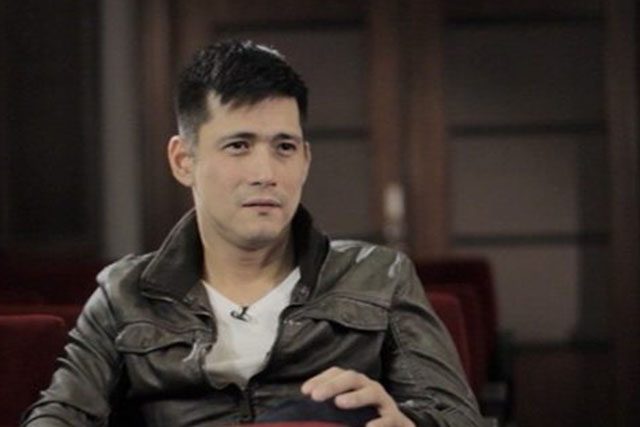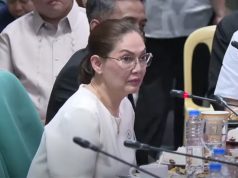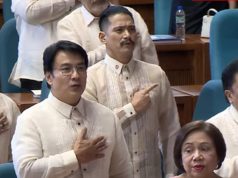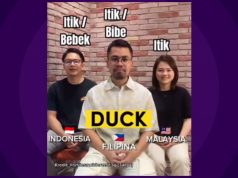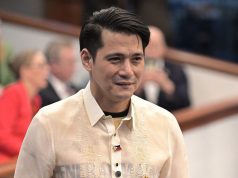Robin Padilla defended his wife’s choice to give birth in the United States amid accusations that they are not being patriotic.
He made the remark on Mariel Rodriguez‘s Instagram post, specifically in response to critics who questioned him about the move. A child born in the United States automatically acquires U.S. citizenship.
Padilla has prided himself as a patriot in public a few times in the past, but recently declared he is more American than average Americans because he has supposed Native American roots.
Robin says he’s more American than Americans and more Filipino than Filipinos.
“Ang pagiging Filipino-American ay hindi pagtataksil sa Inangbayan, lalo na ang asawa ko ay U.S. citizen at ako naman ay may lahing Native American. Mas Amerikano pa kami sa inyong pa Inglis-Inglis at nakatira diyan sa Estados Unidos,” the actor wrote.
Despite this, he added that he and Rodriguez are also “more Filipino” than average Pinoys. He claimed to be a descendant of Gabriela Silang and a “Captain Pablo” of Nueva Ecija.
“Mas Pilipino pa kami sa kanino man dahil sa lola ko pa lang na si Gabriela Silang ng Abra at sa lolo ko na Kapitan Pablo ng Nueva Ecija ay lumalangoy na kami sa pag-ibig sa bayan na ito,” Padilla wrote.
He also called out his critics, saying they shouldn’t be concerned about Rodriguez’s decision to choose to give birth in the U.S.
“Ang babata pa ng mga opinyon ninyo at puro na puna at paghusga. Wala kayong pakialam sa asawa ko dahil Amerikana siya at karapatan at kalayaan niya ang magpakasarap sa Amerika at karapatan ko at kalayaan ko magpakamatay dito sa Pilipinas!” the actor added.
“Wala kayong mga magawang tama, subukan ninyo magligpit ng kama ninyo at ipaghanda niyo ng almusal mga magulang niyo. If you can’t say or do something positive to others, at least do something good for yourself,” Padilla ended.
Reports note that some of the comments on the post have been deleted but Padilla’s response was saved in a screenshot.
More questions over Padilla’s ‘patriotism’
Some Filipinos questioned Padilla’s concept of patriotism since he declared that he has “Native American” blood yet still considers himself “more Filipino” than average Pinoys.
“Hypocrisy at it’s finest,” a Twitter user wrote in reaction to a news report where Padilla justified his and Rodriguez’s actions.
“It shows Robin Padilla’s hypocrisy. He claims to be patriotic, even lashed out at a foreign contestant in a talent (show) despite the foreigner’s willingness to learn our language and culture. And yet here he is, wanting his child to be an American citizen,” another user commented.
Another Twitter user specifically recalled how Padilla displayed his supposed patriotism when he scolded a Korean contestant in “Pilipinas Got Talent” for not being able to speak Filipino despite living in the country for years.
“Robin Padilla has a twisted understanding of being a patriot. One time, he ridiculed a foreigner because of his inability to speak in Filipino and now he tries to elevate himself by saying that he has Native American genes,” the user wrote.
Robin Padilla has a twisted understanding of being a patriot. One time he ridiculed a foreigner because of his inability to speak in Filipino and now he tries to elevate himself by saying that he has Native American genes. Just say gusto niyo maging kano anak mo then go. pic.twitter.com/XrJ0OHVrI9
— Jericho Rayel Timbol (@jerichorayel) October 1, 2019
Padilla was criticized in early 2018 for telling off Korean contestant Kim Jiwan for not knowing how to speak the local language which made him feel “humiliated,” according to reports.
Some Filipinos previously slammed the actor for grilling Jiwan and called him “rude,” “racist” and “insensitive.”
In his defense, Padilla said, “Hindi mo puwede sabihin sa akin na mahal mo ang Pilipinas. Sabi niya mahal niya ang Pilipinas, may girlfriend siyang Pilipina pero hindi siya marunong mag-Tagalog?”
He also addressed his critics by sharing his thoughts on patriotism or loving one’s country based on the goodness of its government and its people.
“Kung tayong mga Pilipino ay hindi tayo magiging patriotic sa bansa natin, huwag tayong humingi ng pagbabago. Kung tayo mananatili tayong alipin ng dayuhan, kayo na lang. Hindi ako magpapaalipin sa dayuhan sa bansa ko. Hindi mangyayari ‘yun. Ako ang hari dito dahil bansa ko ito,” Padilla said before.
What does it mean to be patriotic?
Padilla is not the only one whose sense of patriotism was questioned by Filipinos.
Another actor, Matteo Guidicelli, also created buzz when he responded to a critic after finishing his Scout Ranger Orientation and Leadership Development Course last July and began to share posts perceived to be patriotic.
A particular Twitter user commented that the actor had allied himself with the Armed Forces of the Philippines who is “one of the least patriotic organizations in the country.”
RELATED: How to be a Filipino patriot: Are you a Matteo Guidicelli or an Angel Locsin?
“It’s more concerned with defending foreign capitalists and big businesses (e.g. mining) than safeguarding the people’s welfare,” the critic added.
Guidicelli responded by saying that the Twitter user should “stop talking” instead.
This led to an online conversation where Filipinos shared what patriotism really means and how it could be practiced or manifested in everyday life.
That time, spoken word artist Juan Miguel Severo shared a video clip of Angel Locsin talking about her experience with the Lumad community, a group of indigenous people constantly being red-tagged by the administration in Mindanao.
“This interviewee is a patriot,” Severo said in the caption.
Patriotism is defined as the love of one’s country believing in the goodness of its system of government and its people. It does not equate to sentiments of superiority over other nations, not to the avoidance of criticism of erring officials.
For a former member of the U.S. House of Representatives, patriotism is witnessed among people “who pursue their lives with the good of the country at heart.”
“It means we defend civil liberties, the right to dissent and the equality before the law,” Lee Hamilton said.
“And it means that upholding our core values — tolerance, mutual respect, the right of everyone to be heard, the belief that in pursuing our own lives and interests we all are capable of contributing to the vibrancy of our democracy,” he added.

